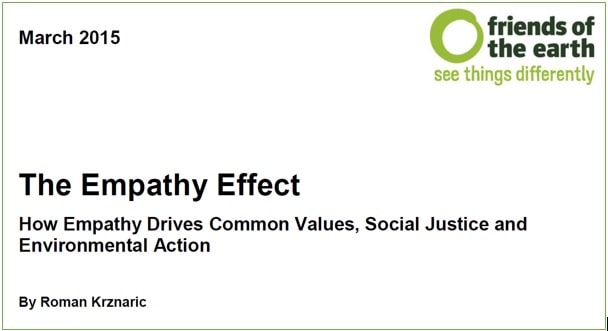How can we harness the power of empathy to tackle the really big global problems like wealth inequality, ecological crisis and our addiction to consumer culture? You’ll find the answers in my new report for Friends of the Earth called The Empathy Effect: How Empathy Drives Common Values, Social Justice and Environmental Action.
The report, which builds on my book Empathy (but goes far beyond it) is part of Friends of the Earth’s exciting Big Ideas project that is drawing together the key ideas and insights we need to create a sustainable future for humankind. It challenges the belief that empathy is a fuzzy feel-good emotion and argues that with a bit of smart thinking it can be transformed into an innovative and powerful campaigning tool.
Here are four fascinating facts from the report, just to give you a taster:
- The wealthier you are the less empathic you are likely to be, and people with psychopathic tendencies who lack empathy are four times more commonly found amongst senior executives than in the ordinary workforce.
- Teaching empathy skills to school kids (yes, it can be done) not only makes them value relationships more, but increases their motivation to take action on environmental issues and immunises them against the lure of consumer culture.
- A review of more than 500 studies showed that in 96% of cases, face-to-face contact between people of different ethnic and religious groups reduced prejudices and social divisions, and built community solidarity.
- Over 7 million people have visited the empathy-based exhibit Dialogue in the Dark, which challenges assumptions and stereotypes around disability.
Overall, the report argues that building a world where we care more about the issues that matter to all of us – from grinding poverty to environmental collapse – requires using empathy to create a cultural shift from buying to belonging, where we jettison the hyperindividualism of the twentieth century and start to take collective values seriously. But there are no quick-fix solutions. We need to embark on a generational project of ‘deep lobbying’ that overhauls our education systems and sets us on course for a more empathic civilisation.
You can download the full report here.
Roman Krznaric is the author of Empathy, and founder of the Empathy Museum and Empathy Library.
